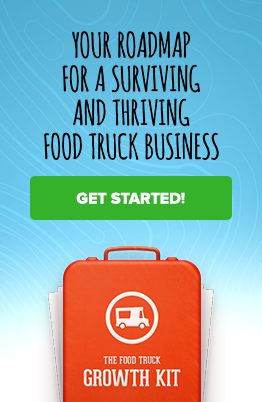Editor’s Note: Hey FoodTruckrs! Whether you’re just learning how to start a food truck or you’re looking for more ways to improve your food truck business, today’s lesson is an important one for everyone to consider. Between electricity, fuel, food, and disposable dishes, food trucks can output a lot of waste. Fortunately, there are some ways to lessen the impact your truck has on the environment—and today, special guest author Jennifer Bland of RatRaceGrad.com will show you how. Take it away, Jennifer!
Food trucks are wildly popular with customers these days thanks to their convenient locations, low-key atmosphere, and inexpensive food. Though they’ve been around since the 1950s, the recent surge in food trucks has brought up a new debate: Are food trucks eco-friendly?
Operating your own eco-friendly food truck is an economical, simple way to own your own restaurant, and anybody can get into the business with enough dedication. In months, you can be running your very own truck, and you can do it with a “green” mentality, too.
Getting the Basics Out of the Way
Your first step is to learn the logistics of running your business. As others have found, you’ll have to make sure that it’s legal for you to operate your truck in your planned neighborhood first so that you can obtain a permit. Don’t underestimate the number of permits you will need!
You’ll also have to decide where to do business. A busy tourist spot or a popular park can be a great place to find environmentally-conscious customers who may even go out of their way to support your green food truck, but don’t forget to check local ordinances to make sure that it’s legal for you to set up shop in that spot.
Once everything is in order, things get a lot more fun! Choose a fun business name that reflects the food, theme, or concept of your truck and that draws people in. Make the most of your green truck credentials—customers will feel good that they’re helping the environment by choosing your truck.
Eco-friendly food trucks are commonly run by those looking to offer healthy, economical options for their customers, and are not necessarily the types of business owners that can throw around huge sums of cash from the start. That means that financing your eco-friendly food truck can be one of the biggest hurdles. The good news is that a food truck is significantly less expensive to run than a sit-down restaurant—especially when you’re focused on eliminating waste and running a green business.
You may still have to look to private investors or bankers to help finance your truck, but you can choose between a used model for as little as $20,000 and make repairs to improve it’s environmental impact or go big with a high-end, fully outfitted new truck for $150k+. Of course, your start-up costs will also include stocking your truck with all of the eco-friendly materials you will need. You should also consider saving up an emergency fund in case you need equipment repairs or experience a drop in business down the line.
Eco-Friendly Menus
Now you’ll want to focus on the menu. This is one of your first real opportunities to be eco-friendly by choosing healthy, sustainable food options. If possible, make sure that your ingredients are locally sourced and in season. Source sustainable meat that is grass-fed and uses only organic ingredients. High-quality produce, meat, dairy, and even grains and spices have become much easier to find. Try to keep it healthy—and, of course, delicious! When your menu is created, you’ll need a menu board and to-go menus for customers to take. You should also decide if you’ll have the same menu every day or if you will rotate daily specials.
Lower Your Energy Use
Once you have an idea of the type of food you want to make, you should decide which suppliers you’ll use and stock your kitchen. You’ll also need appliances such as an oven, a fryolator, and a cooler space, depending on what you’re serving. Outfitting your food truck will be similar to designing a commercial restaurant kitchen. Many food truck owners will go for the cheapest options, but in your case, you will be looking for the items that expend the least energy. Apart from the eco-friendly benefits to using less energy, you’ll also save money!
Cut Out Waste
Another way to protect the environment is to cut down on waste. One of the biggest issues with food-trucks is their high waste, thanks to the fact that they use mostly plastic plates, utensils and glasses. It’s better to use biodegradable materials—or, if your truck will have room for a small seating area, you could consider using real plates and silverware and giving customers the option of ordering their meals “for here.” These days, it’s easy to cut down until your food truck is producing little waste—and in many ways, it can ultimately end up meaning better service for your customers.
Alternative Fuels
The greatest factor to consider when running your eco-friendly food truck is fuel. Giant, gas-guzzling trucks can get as little as four to five miles per gallon, which means a lot of fuel is required for just one truck. Luckily, food trucks have the option of using biodiesel. There are also some food trucks that run entirely on electric power. You can also find many creative alternative energy sources to keep your kitchen running. You can use solar energy to power your kitchen, and you might even be able to sell the excess electricity back to the utility company.
An alternative that many food truck owners have explored is using recycled cooking oil and turning it into biodiesel. Some trucks even have wood-fired ovens. Fortunately, even if you choose to use a standard generator for electricity, the consumption is generally less than a brick-and-mortar restaurant, so a food truck is already more eco-friendly.
Make Green From Being Green!
Your last step is to get the word out about your business. Thanks to social media, you can easily promote your truck through Facebook, Twitter, and Instagram. Send out tweets advertising your truck and letting customers know early on where you’ll be parked that day. You can create a clever hashtag to represent your food truck, and get it trending. The truck itself provides a moving advertisement, so make sure you love how it looks. Be sure to promote that you are a proud, eco-friendly business.
You can also really engage your customers by offering promotions, events, and incentives. For example, you could have punch cards that include a free appetizer with every ten visits or you could offer a free meal every time someone brings back ten recyclable containers, which would help to spread the eco-consciousness. You could have an opening event, or an annual “free drink” day to pull in customers. Utilize your social media followers by offering online contests to win gift cards.
By running an eco-friendly food truck, you can enjoy the career that you love while bringing fun, healthy food to everyone, everywhere. Whether you’re in love with the food truck business or hoping to take a step toward owning your own full-service restaurant, enjoy the experience and keep clear goals for the future. Keep in mind where you hope to be in a year, five years, or even ten years, and take every opportunity you can to push yourself toward that goal. Be prepared for a lot of hard work, and be ready to motivate yourself even when things seem impossible. And most importantly, remember what awesome work you’re doing by moving yourself and those around you toward a sustainable future!
image by James Wang
There is no ads to display, Please add some


